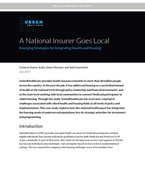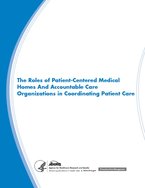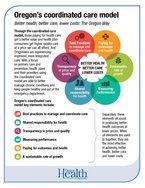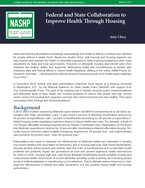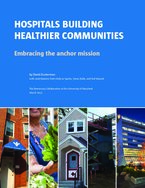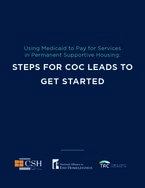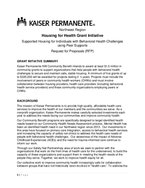Found 67 resources.
0
0
0
The North Coast Health Improvement and Information Network (NCHIIN) was funded by DASH CIC-START to add new partners, sectors, mental health client summary data, and facility alerts to ACT.md, the care coordination and alerts notification system in Humboldt County, CA. As part of their CIC-START project, NCHIIN developed this document, which provides a methodology for onboarding new organizations, data streams, and sectors into the ACT.md platform.
Topics: Criminal justice, Data sharing, Health, Mental health, Partnerships, Substance abuse
0
0
0
The Addressing Healthcare’s Blindside in Albuquerque’s South Side (AHBASS) collaborative participated in the BUILD Health Challenge’s first cohort with the intention of “making the healthy choice, the easy choice” for community members. Now you can learn about their strategies, approaches, application of the BUILD principles, and outcomes in this new case study documenting their work. Follow along in this case study and see how this Albuquerque, NM, based team addressed chronic disease and self-management in their community. Together, they established a multi-sector collaboration that...
Topics: Data sharing, Food insecurity, Health, Low-income, Nutrition, Partnerships
0
0
0
Today, health care providers’ complaints about legal obstacles to health information exchange (HIE) may be better understood as reflecting concerns about the economic and competitive risks of information sharing.
Topics: Data sharing, Health, Partnerships, Research
0
0
0
Health departments provide public health protections in a number of areas, including: preventing the spread of communicable disease, ensuring food, air, and water quality are safe, supporting maternal and child health, improving access to clinical care services, and preventing chronic disease and injury. In addition, public health departments provide local protections and services unique to their community’s needs.
Topics: Data sharing, Health, Metrics, Partnerships
 Shared by Housing Is
on Dec 17, 2018
Shared by Housing Is
on Dec 17, 2018 0
0
0
Karis Grounds, MPH, Vice President of Health and Community Impact at 2-1-1 San Diego, joined the podcast to discuss how she is supporting the strategic development of San Diego’s community information exchange (CIE), a technology platform that is enabling data sharing and collaboration between health and social service providers to deliver person-centered care and improve health equity. Grounds shared strategies for aligning multi-sector partners around a shared language and an integrated technology platform to deliver enhanced care coordination. She also discussed how 2-1-1 San Diego is...
Topics: Data sharing, Health, Partnerships
0
0
0
Leah Hendey, MPP, Senior Research Associate at the Urban Institute, joined the podcast to reflect on her experiences co-directing the National Neighborhood Indicators Partnership (NNIP), a nationwide effort to advance the use of neighborhood-level data to drive local decision-making. NNIP is led by the Urban Institute and a network of 32 partners representing local data intermediaries across the country. Hendey discussed the role local data intermediaries play in their communities, explained how neighborhood-level data can be used to understand and address issues of health equity, and shared...
Topics: Community development, Data sharing, Health, Partnerships, Place-based
0
0
0
Housing and school segregation function as mutually-sustaining phenomena that limit perceived housing and school choices, constrain social networks, and curb employment and educational potential. Despite the link between housing and school segregation, however, many initiatives combating segregation tend to focus on one or the other instead of recognizing their inherent connectedness.
Topics: Data sharing, Dual-generation, Education, Housing, Legislation & Policy, Low-income, Mobility, Partnerships, Racial inequalities, Research
0
0
0
Josie Williams, Project Coordinator at the Greensboro Housing Coalition, joined the podcast to discuss a BUILD-funded project called “Collaborative Cottage Grove” that is fostering resident-led efforts to improve poor housing conditions that are leading to asthma-related emergency department visits in the Cottage Grove neighborhood of Greensboro, NC. Motivated by a desire to improve conditions in neighborhoods similar to the one she grew up in, and guided by resident voices, Williams is working with multi-sector partners to map asthma hospital visits and housing condition data to identify...
Topics: Asthma, Data sharing, Health, Housing, Partnerships
0
0
0
CLPHA’s Housing Is Initiative is engaged in a number of cross-sector activities focused on developing partnerships, facilitating a community of practice, resource development, promoting best practices, online collaboration, policy and advocacy, and training and education. Read about recent activities in this Fall Update.
Topics: Child welfare, CLPHA, Community development, Cost effectiveness, Data sharing, Early childhood, Education, Family engagement, Funding, Health, Homelessness, Housing, Low-income, Medicaid / Medicare, Mental health, Partnerships, Place-based, Post-secondary, Research, Stability, Substance abuse, Workforce development, Youth
0
0
0
The Roundtable brought together over 70 experts from federal, state, and local government, the private sector, nonprofit organizations, and academia. The objective of the Roundtable was to “explore possibilities and limits of data sharing, and identify successes and proposed solutions for using data to address the opioid crisis.”
Topics: Data sharing, Health, Partnerships, Substance abuse
0
0
0
The health care system is transforming to deliver value and maximize health across a patient’s lifespan. In this new landscape, there is rapid adoption of health technology to deliver patient-centered, whole person care. This issue brief explores elements for technology applications emerging to “close the loop” between clinical and community services and presents accelerators and challenges to their adoption.
Topics: Child welfare, Data sharing, Early childhood, Health, Partnerships, Youth
0
0
0
During this All In webinar, Caroline Fichtenberg of SIREN reviewed the current landscape of assessment tools and outcomes measures for social needs. Karis Grounds of 2-1-1 San Diego explained how they incorporated social needs assessment into their Risk Rating Scale, which helps them better serve clients while showing the impact of their services.
Topics: Data sharing, Health, Low-income, Metrics, Partnerships, West Coast
0
0
0

A growing recognition of the importance of social determinants of health (SDOH) has led to a proliferation of screening and assessment tools, but there are currently no national standards for how to systematically capture and address the non-health needs of patients. To provide some guidance for communities just starting out on this path, All In: Data for Community Health hosted a webinar featuring two subject matter experts.
Topics: Data sharing, Health, Metrics, Partnerships
0
0
0
This guide aims to provide resources and advice from the experiences of those in the NNIP network and other related organizations on developing a strong data governance program and protecting the security of confidential data.
Topics: Community development, Data sharing, Partnerships
0
0
0
UnitedHealthcare provides health insurance benefits to more than 40 million people across the country. In the past decade, it has addressed housing as a social determinant of health at the national level through policy leadership and financial investments, and at the state level working with local communities to connect Medicaid participants to stable housing. Through this work, UnitedHealthcare has overcome a myriad of challenges associated with siloed health and housing fields at all levels of policy and implementation. This case study explores how this national health payer has integrated...
Topics: Affordable Care Act, Data sharing, Funding, Health, Homelessness, Housing, Low-income, Medicaid / Medicare, Partnerships
 Shared by Housing Is
on Aug 9, 2018
Shared by Housing Is
on Aug 9, 2018 0
0
0

Through the hard work of communities around the country, we now have proof of something that we didn’t before—that ending homelessness is achievable. Home, Together builds upon what we have learned from states and communities over time, and lays out the strategies we know we must advance at the federal level in order to support and accelerate state and local progress.
Topics: Cost effectiveness, Data sharing, Disabilities, Dual-generation, Homelessness, Housing, Legislation & Policy, Low-income, Mental health, Partnerships, Preventative care, Racial inequalities, Stability, Substance abuse, Supportive housing
 Shared by Housing Is
on Aug 7, 2018
Shared by Housing Is
on Aug 7, 2018 0
0
0
We sought to learn more about how state- and locally funded rental
assistance programs were created, how they are structured, whom they serve, and how they are funded.
Topics: Cost effectiveness, Data sharing, Disabilities, Family engagement, Funding, Health, Homelessness, Housing, Legislation & Policy, Low-income, Partnerships, Research, Supportive housing
 Shared by Housing Is
on Aug 1, 2018
Shared by Housing Is
on Aug 1, 2018 0
0
0
This report aims to provide the Robert Wood Johnson Foundation (RWJF) and other health foundations with a perspective on the emerging intersection of social determinants of health (SDOH), health care systems, and social and other services. These fields intersect in how and what data are collected, and in ways the data are used to improve health and well-being and promote a Culture of Health.
Topics: Data sharing, Funding, Health, Medicaid / Medicare, Metrics, Nutrition, Partnerships, Place-based, Research
 Shared by Housing Is
on Jul 27, 2018
Shared by Housing Is
on Jul 27, 2018 0
0
0
The effective coordination of a patient’s health care services is a key component of high quality and efficient care. In this brief we first describe the goals of care coordination and the central role for primary care, followed by the specific activities involved in care coordination. Next we summarize the evidence on the effectiveness of different care coordination activities that PCMHs and ACOs can pursue. Finally, we suggest roles for PCMHs and ACOs in coordinating care and summarize key points.
Topics: Data sharing, Health, Partnerships, Preventative care
 Shared by Housing Is
on Jul 27, 2018
Shared by Housing Is
on Jul 27, 2018 0
0
0
Through the coordinated care model, those paying for health care get a better value and health plan consumers get higher quality care at a price we can all afford. And Oregonians are experiencing improved, more integrated care. With a focus on primary care and prevention, health plans and their providers using the coordinated care model are able to better manage chronic conditions and keep people healthy and out of the emergency department.
Topics: Cost effectiveness, Data sharing, Health, Metrics, Partnerships
 Shared by Housing Is
on Jul 24, 2018
Shared by Housing Is
on Jul 24, 2018 0
0
0
In December 2016, federal and state policymakers examined health and housing issues at a meeting convened in Washington, D.C., by the National Academy for State Health Policy (NASHP) with support from The Commonwealth Fund. The goal of the meeting was to identify concrete policy recommendations and actionable steps to align health and housing programs to ensure that people with high service needs receive the housing and supportive services they need to become and stay healthy. This report summarizes their findings and recommendations
Topics: Data sharing, Disabilities, Health, Homelessness, Legislation & Policy, Low-income, Medicaid / Medicare, Partnerships, Supportive housing
 Shared by Housing Is
on Jul 19, 2018
Shared by Housing Is
on Jul 19, 2018 0
0
0
Hospitals Building Healthier Communities aims to provide a resource for hospitals considering adopting or further integrating community engagement and economic development into their daily operations and their core mission.
Topics: Community development, Data sharing, Health, Housing, Low-income, Partnerships, Place-based, Research
 Shared by Housing Is
on Jul 13, 2018
Shared by Housing Is
on Jul 13, 2018 0
0
0
This guide is organized around five steps, each of which includes concrete ways to get started as well as links to additional resources. These five steps will help you build a case for why and how Medicaid can be structured at the state and local levels to pay for services in permanent supportive housing. When building a case you need to know some basics of Medicaid and the types of services you want Medicaid to cover. in order to convince Medicaid administrators and other health care payers to support your efforts, you need to have evidence of need for and impact of supportive housing and...
Topics: Affordable Care Act, Data sharing, Funding, Health, Homelessness, Medicaid / Medicare, Partnerships, Supportive housing
 Shared by Housing Is
on Jul 13, 2018
Shared by Housing Is
on Jul 13, 2018 0
0
0
This paper offers strategic guidance in building, assessing and/or strengthening various types of partnerships between Health Center Program Grantees, behavioral health providers and supportive housing providers. Whether you represent one of these types of organizations or you are merely curious about health and housing partnerships, you can use this guide as your roadmap.
Topics: Data sharing, Dual-eligibles, Health, Low-income, Medicaid / Medicare, Partnerships, Supportive housing
 Shared by Housing Is
on Jul 13, 2018
Shared by Housing Is
on Jul 13, 2018 0
0
0
Recognizing the layers to developing a health and housing partnership, this Literature Review and Resource Bank is intended to provide background and data resources that can be used in grant applications or in conversations with potential funders in the effort to foster new health and supportive housing partnerships.
Topics: Cost effectiveness, Criminal justice, Data sharing, Dual-eligibles, Funding, Health, Homelessness, Housing, Low-income, Medicaid / Medicare, Mental health, Partnerships, Post-secondary, Preventative care, Research, Seniors, Substance abuse, Supportive housing, Youth
 Shared by Housing Is
on Jul 13, 2018
Shared by Housing Is
on Jul 13, 2018 

